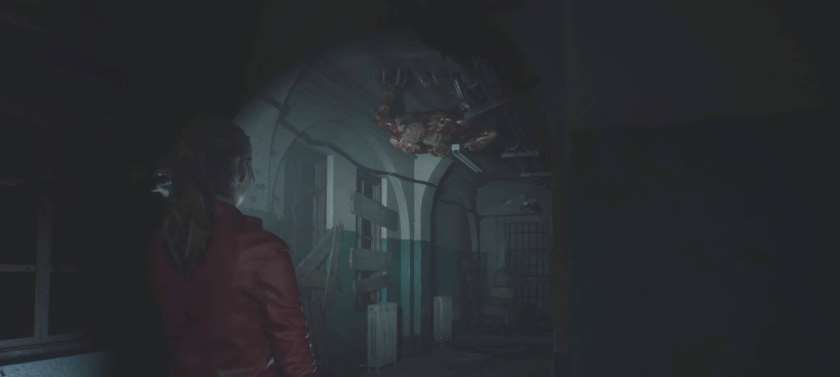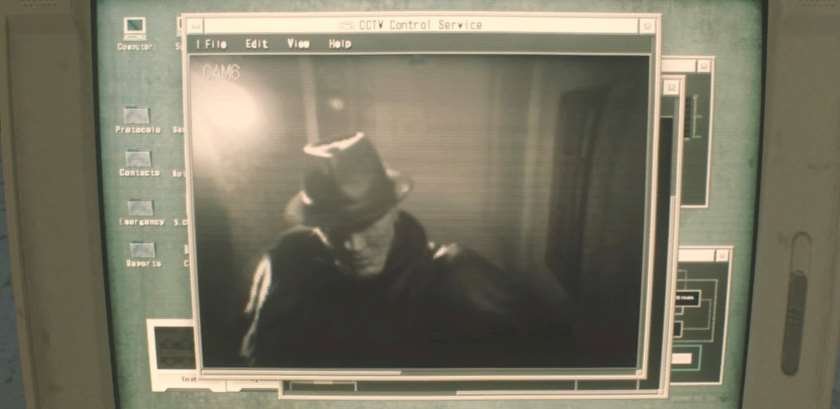Resident Evil 2 and the Stoic Stalker

[This essay will contain gameplay spoilers for the 2019 Resident Evil 2 remake.]
I haven’t entirely clicked with the survival horror genre. I have a great fondness for the Resident Evil and Dead Space franchises, but both games have always had an action-oriented element to them. The closer you step towards actual horror and strip away the empowering capabilities of the player, the more shaken up my heart becomes.
Alien: Isolation is a perfect example. I’ve always blamed my inability to complete it on the first-person perspective, but in truth I might simply find great discomfort in being so obviously outmatched. Options and resources are few and if the Xenomorph so much as spots you it’s game over. I still recall setting the game down each night after having reached a suitable stopping point. The excitement and adrenaline continued to flow through my very veins, providing a sense of ceaseless vibration as I sat in my chair. I could not go to sleep in such a manner. I needed to swap out to Destiny so that I could “calm my nerves”, relaxing into the empowerment of a constantly resurrecting guardian.
I find the description of games being a power fantasy – a specifically masculine one at that – tiresome and reflecting a misunderstanding of the medium’s appeal. A game is not truly satisfying if it is not challenging. If the enemy A.I. and behavior demands I better understand the tools at my disposal or pay the consequences, then it is encouraging me to think and learn. The game only rewards those that adapt. The adaptation is what provides the satisfaction. In my mind, a “power fantasy” provides no challenge. It simply lets the player wade through the game, standing proud atop a hill although they did little more than show up.
So theoretically I should be absolutely on board with the disempowering demands of the survival horror genre. Player adaptability is a must should you yearn to progress and survive. Inventory space becomes limited, ammunition is more scarce, and the character is more frail. The consequences of failure are often greater, sending the player back to a prior save state – which could have been over an hour ago.
Ah, consequences. That perhaps shines a far brighter light on the issue than I had once expected. The consequences in survival are often drastic, and consequences are suffered by making a mistake.
I had been playing Devil May Cry 3 prior to the Resident Evil 2 remake . It was my first time through and therefore required I not only learn its mechanics, but the behaviors of each malevolent occupant of the setting. The consequences of each poorly timed dodge or unforeseen strike against Dante was a chunk of my health, but not enough to threaten my overall success. If I chose to use a restorative item towards chapter’s end that proved to be a waste, I didn’t feel like I lost a precious resource. Dying at the hands of a particularly challenging foe often just warped me back outside of that monster’s chambers.
There are still consequences to be suffered, but the severity of those consequences is light. You have to make a lot of mistakes in order to truly suffer and have your progress wiped out, and you’re more likely to run into restorative items to help clean some of your slate. Even when you are wiped out, checkpoints and saves are generous.

In contrast, the earlier Resident Evil games give their protagonists comparatively low health to demon hunter Dante. Inventory space is limited, meaning you may not pack enough ammunition, health, or even key items for your trip through the deadly hallways. Ink ribbons are finite, and should you use them too often you’ll not have enough ink towards the game’s end. The longer you go without saving, however, and the more you would need to backtrack should you die. Let’s say you lucked into a headshot or two dashing through the cramped hallways of the mansion, only to swiftly be swallowed by Yawn the snake and need to replay all that progress. Suddenly what took seven bullets has taken twenty, and both zombies that once had their craniums combusted are now at risk of turning crimson.
The increased fragility of the protagonist and loss of empowerment is an easy mechanic to point to as explanation for increased anxiety playing a horror game. The first-person perspective is even more-so a clear difference between games like Alien: Isolation and Dead Space or Resident Evil. In truth, however, I think the real culprit is a fear of making a mistake. In some games it manifests strongly while in others it manifests weakly, but at its core there is a fear of great and unforeseen consequences for making one seemingly small decision.
This is why I set Resident Evil 2 to Assist Mode on A and B playthroughs. I’m not even sure of the last game I played on its easiest difficulty setting. The fear of sinking several hours into Resident Evil 2 only to get stuck was so strong, however, that I dropped the challenge as low as it could go.
When I first encountered the Tyrant – referred to by fans as Mr. X back in ‘98 and today – I became really frustrated. I now had to wander the zombie-infested halls of the police station while avoiding this invincible monstrosity whose sole purpose is to terminate Leon or Claire. Add to this stress an increase in zombies and wall-crawling Lickers, all of which will draw Mr. X to your location should you engage in combat, and the game’s tension became wound so tight it could decapitate, let alone choke.
A least, that was my first impression. Reflecting on my enjoyment of the original Resident Evil remake, there was a general pace of increased tension followed by relaxed familiarity. Entering a new room would always be a nervous experience, but as I explored the mansion I could determine which routes were safe and which rooms I could safely abandon altogether. Each time I replayed the game and better knowing what to expect, I was able to strategically choose which zombies I could leave alive, which ones I had to kill, and which I needed to burn to avoid running into Crimson Heads. The game threw a curveball part way through by introducing the reptilian Hunters into key locations, but I could always plan for them as well. Subsequent trips through the Spencer mansion thus became a more relaxed affair.
The presence of Mr. X throws a wrench into such relaxed planning, instead opting for a more dramatic and tense interaction with the player. As illustrated previously, the simple act of sneaking around a Licker gains greater risk the second Mr. X turns a corner and begins pursuit. The second Leon or Claire begin to run is the second the far faster Licker gives chase, and any devastating blow is bound to give Mr. X time to catch up. The player can still plan to avoid that hallway, but there’s always a chance that Mr. X will begin pursuit from another room of the station and push the player into a confrontation with the Licker.
Anyone reading this is no doubt familiar with my love of Metroid and Zelda games, and thus likely understands that the exploration and puzzle solving are a primary ingredient that drew me to Resident Evil in the first place. That Mr. X directly interferes with this aspect of the game is partially why my knee jerked so violently against his inclusion, or at least the manner of it. However, I think there was yet another element: greater chances for mistakes with more immediate consequences. What if I make a wrong turn and Mr. X is actually around the corner? What if he shows up while I’m in this cramped space? What if I have to install some bullets in the kneecaps of some zombies, drawing him to my location?
I was even more exasperated to discover that Mr. X was prevalent right at the start of the B-Route, increasing his presence far more than before. There was no calm instance of exploration. Everything came with a sort of pressure, knowing that Mr. X would inevitably be hot on my heels
It was during this second playthrough, however, that I began to adapt. I knew Mr. X appearing in certain circumstances was an inevitability, so I started planning for it. I developed an instinctive “In Case of Mr. X” response plan, knowing which rooms to dash to in order to hide and which rooms to lure him so that I might easily get around his broad frame. Suddenly I was not only abandoning certain routes due to the presence of Lickers, zombies, or dead-ends, but better memorizing the layout of different rooms so that I could plan my confrontation or flight.
Most of all, I learned that the consequences… really aren’t so severe. With all the spare ammunition and herbs I had stacked in my item box each playthrough, I felt as if I cheated myself by selecting Assist mode. The atmosphere, music, and frailty of my characters will always create tension and suspense whenever I play a Resident Evil, but I don’t need to be so frightened of making a mistake.
Turns out Mr. X not only helped me learn that, but also helped me understand why this genre gets the butterflies in my stomach all fluttering to escape.


